【讲语法】14 名词性从句高考英语语法知识点梳理课件(全国通用)(59张PPT)
文档属性
| 名称 | 【讲语法】14 名词性从句高考英语语法知识点梳理课件(全国通用)(59张PPT) |  | |
| 格式 | zip | ||
| 文件大小 | 3.0MB | ||
| 资源类型 | 教案 | ||
| 版本资源 | 通用版 | ||
| 科目 | 英语 | ||
| 更新时间 | 2022-11-19 13:07:16 | ||
图片预览

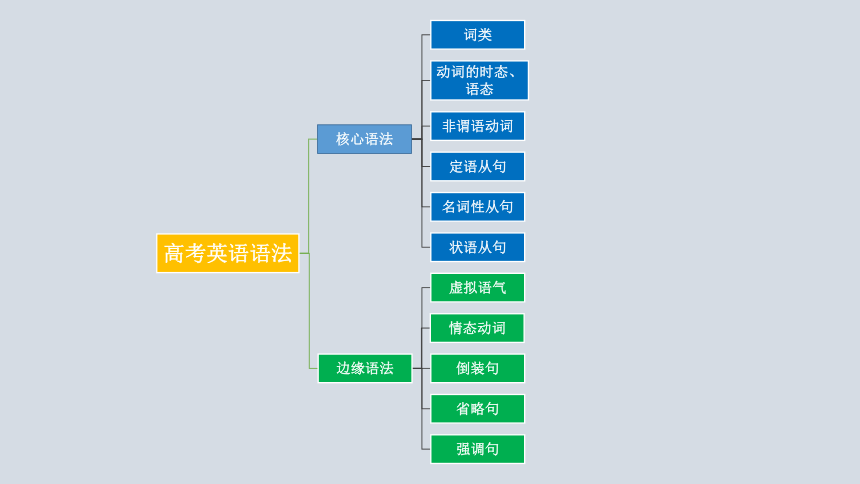
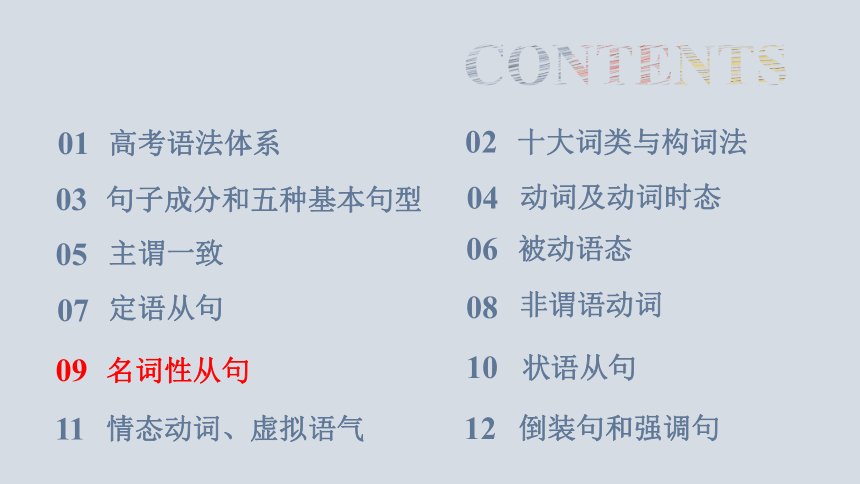
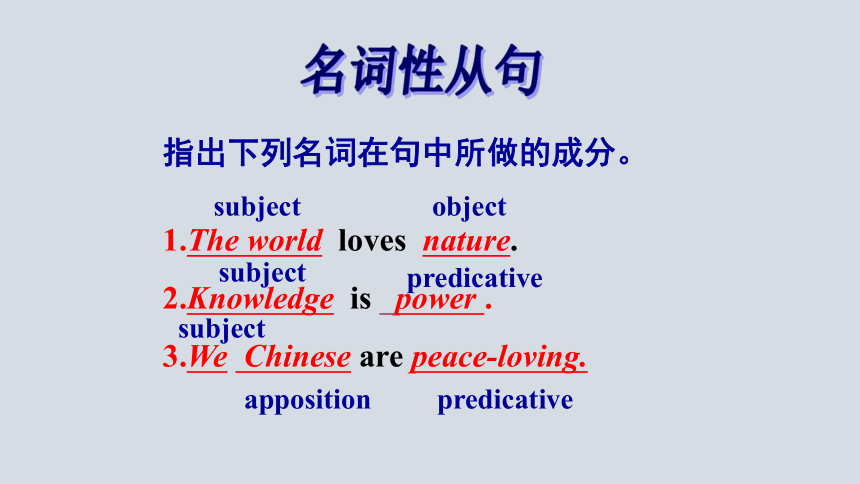
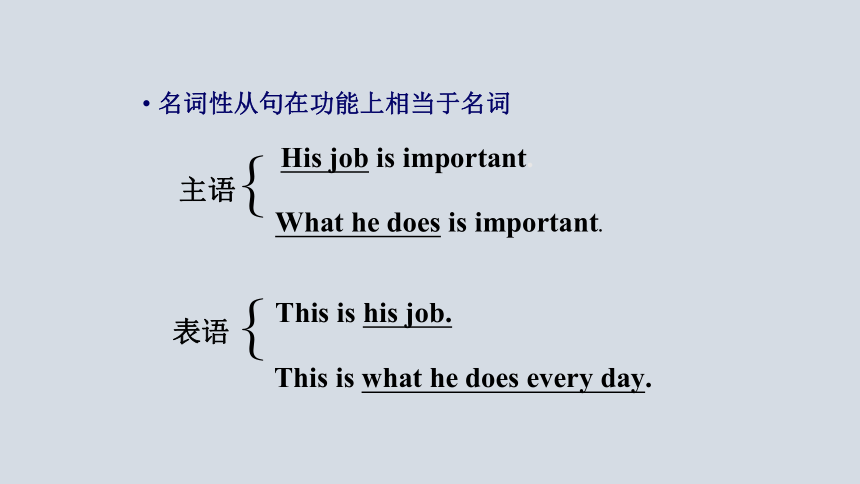
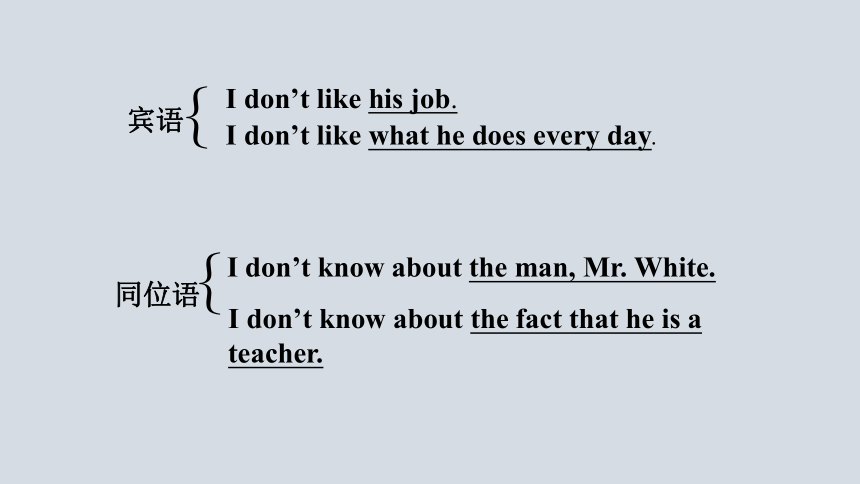
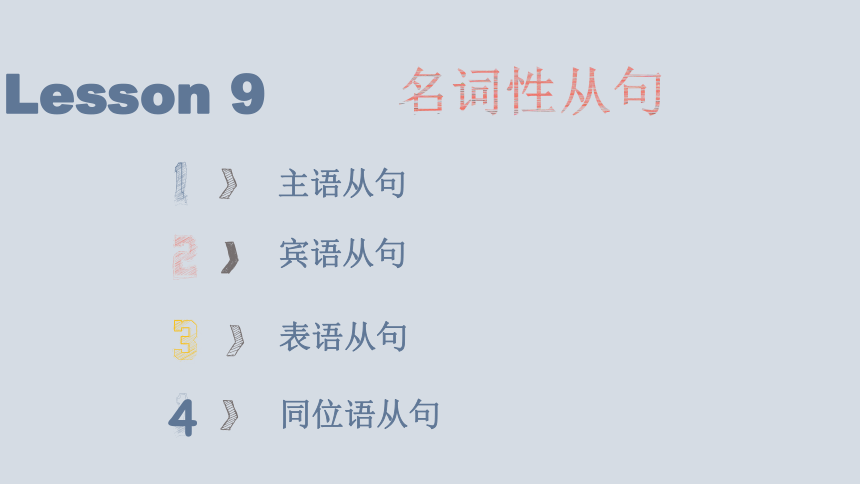
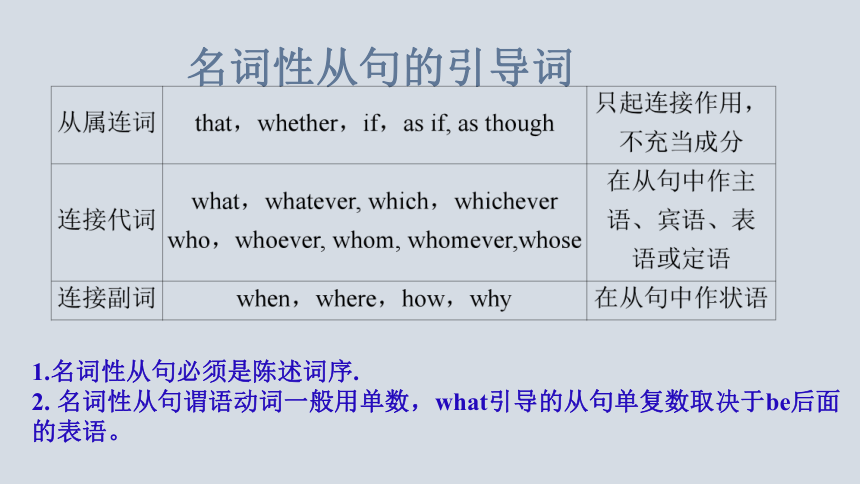
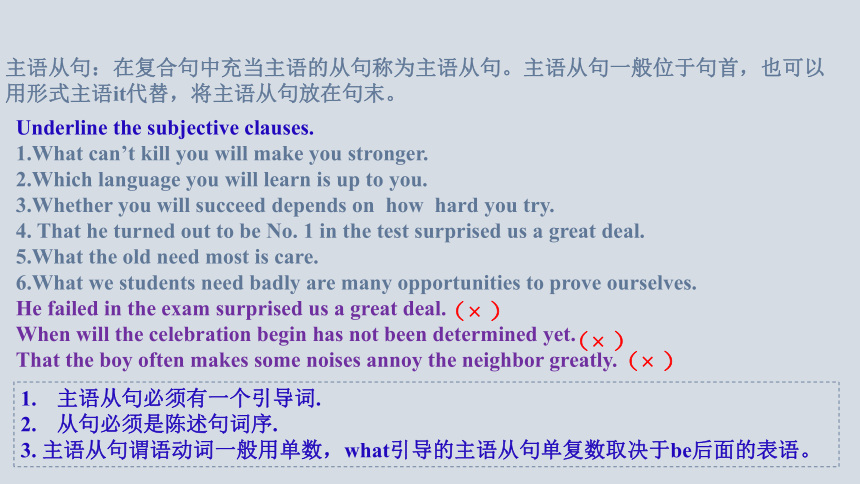
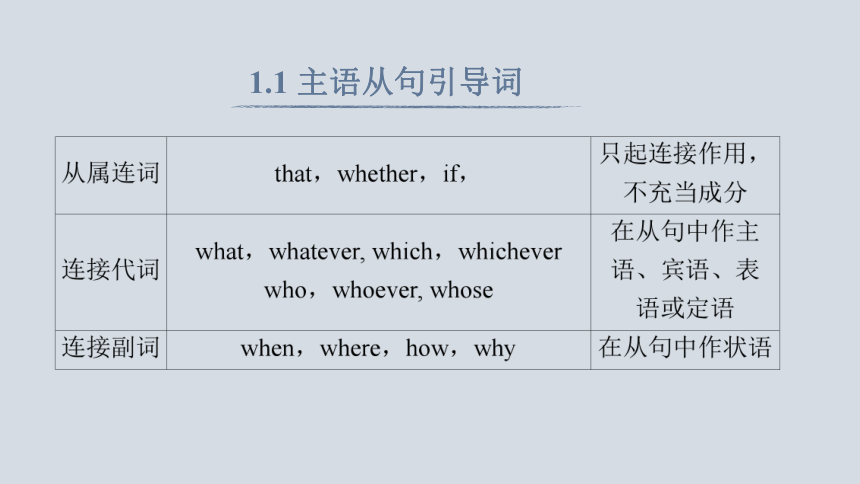
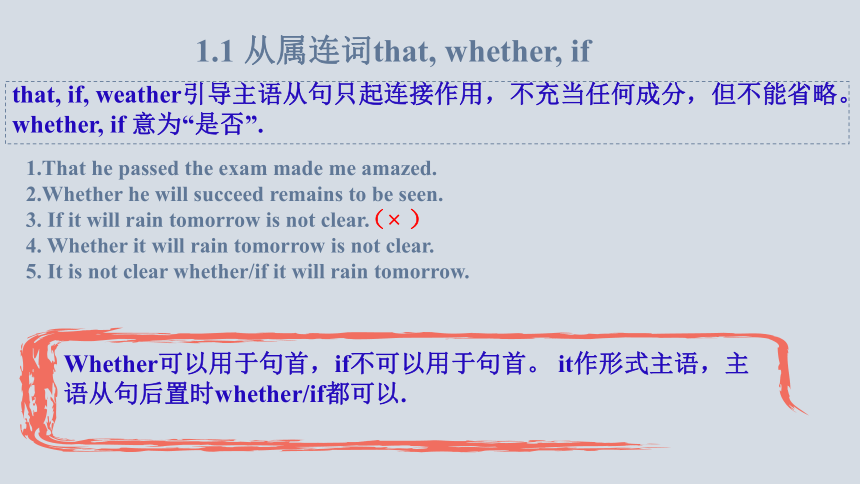
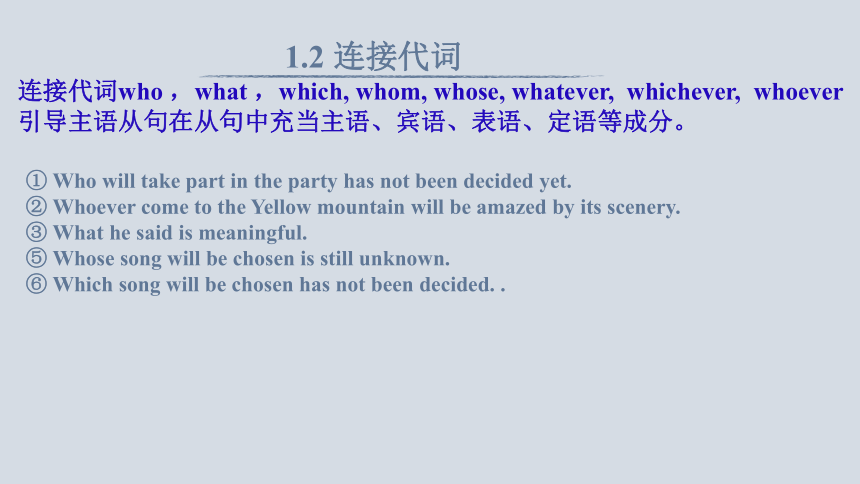
文档简介
(共59张PPT)
高考英语语法
CONTENTS
十大词类与构词法
02
动词及动词时态
04
非谓语动词
08
名词性从句
09
情态动词、虚拟语气
11
倒装句和强调句
12
高考语法体系
01
句子成分和五种基本句型
03
被动语态
06
定语从句
07
状语从句
10
主谓一致
05
指出下列名词在句中所做的成分。
1.The world loves nature.
2.Knowledge is power .
3.We Chinese are peace-loving.
subject
object
predicative
subject
subject
apposition
predicative
名词性从句
名词性从句在功能上相当于名词
主语
{
His job is important.
What he does is important.
表语
This is his job.
This is what he does every day.
{
宾语
{
I don’t like his job.
I don’t like what he does every day.
同位语
{
I don’t know about the man, Mr. White.
I don’t know about the fact that he is a teacher.
主语从句
宾语从句
表语从句
名词性从句
Lesson 9
同位语从句
4
名词性从句的引导词
1.名词性从句必须是陈述词序.
2. 名词性从句谓语动词一般用单数,what引导的从句单复数取决于be后面的表语。
主语从句:在复合句中充当主语的从句称为主语从句。主语从句一般位于句首,也可以用形式主语it代替,将主语从句放在句末。
Underline the subjective clauses.
1.What can’t kill you will make you stronger.
2.Which language you will learn is up to you.
3.Whether you will succeed depends on how hard you try.
4. That he turned out to be No. 1 in the test surprised us a great deal.
5.What the old need most is care.
6.What we students need badly are many opportunities to prove ourselves.
He failed in the exam surprised us a great deal.
When will the celebration begin has not been determined yet.
That the boy often makes some noises annoy the neighbor greatly.
主语从句必须有一个引导词.
从句必须是陈述句词序.
3. 主语从句谓语动词一般用单数,what引导的主语从句单复数取决于be后面的表语。
(× )
(× )
(× )
1.1 主语从句引导词
that, if, weather引导主语从句只起连接作用,不充当任何成分,但不能省略。whether, if 意为“是否”.
1.1 从属连词that, whether, if
Whether可以用于句首,if不可以用于句首。 it作形式主语,主语从句后置时whether/if都可以.
1.That he passed the exam made me amazed.
2.Whether he will succeed remains to be seen.
3. If it will rain tomorrow is not clear.
4. Whether it will rain tomorrow is not clear.
5. It is not clear whether/if it will rain tomorrow.
(× )
连接代词who ,what ,which, whom, whose, whatever, whichever, whoever 引导主语从句在从句中充当主语、宾语、表语、定语等成分。
1.2 连接代词
① Who will take part in the party has not been decided yet.
② Whoever come to the Yellow mountain will be amazed by its scenery.
③ What he said is meaningful.
⑤ Whose song will be chosen is still unknown.
⑥ Which song will be chosen has not been decided. .
1.What you said is right.
2.Whatever you said is right.
=Anything that you said is right.
3. Whoever breaks the law will be punished.
=Anyone who breaks the law will be punished.
4. You can pick whichever book you like.
=You can pick any book that you like.
whoever=anyone who
whatever=anything that
whichever=any+名词+定从,并且不能写成no matter +wh-的形式
Whatever you say, I won’t believe you.
=No matter what you say, I won’t believe you.
______ he is a famous singer is known to us.
______ they are badly in need of help is quite clear.
______ university Li Hua will go is unknown.
______ he wants is a book.
_____ I’m unwilling to do is refuse his invitation.
______ student will win the first is uncertain.
1.that: 不做成分, 只起连接作用,不能省略
2.what除连接作用外,还在充当主语、宾语、表语、定语、补语等。
3. which (意为哪种,哪个…,表选择)what 强调内容,which强调选择。what无范围,which有范围。
That
That
Which
What
What
Which
连接副词when,where, how, why在主语从句中做状语。
1.5 连接副词
Why they suddenly disappeared still remains a mystery.
When they will set off is not decided.
Where she is from is unknown.
How we will paint the house has not been decided.
主语从句为了避免 “头重脚轻”, 常用 it 作形式主语, 把主语从句放在后面。
常见句型:(1)It+be+形容词+that从句
It is obvious that these measures are effective.
It is natural that he (should) fall in love with her.
(2)It+be+名词(a pity/a shame/no wonder等)+that从句
It is a pity that we lost the match.
(3)It+be+过去分词(said/told/reported/suggested等)+that从句
It is reported that 20 people were killed in the accident.
It is suggested that we should do exercise everyday.
(4)It+不及物动词(seem,appear,happen,matter, occur 等)+that从句
It occurred to me that I didn’t close the door. (我突然想到…)
=It struck/hit me that
It happens that (碰巧…) It seems/appears that(似乎)
It matters little what he said= It doesn’t matter what he said.
It’s certain/possible/unlikely/obvious that…
It is necessary/important/natural/strange... that …should do…
Practice
1 _______the teacher said is very important.
2._________ we will go to the park tomorrow afternoon by bus hasn’t been decided yet.
3. ________ the earth goes round the sun is known to us all.
4._______ can join in the sports meet is decided by the teacher.
5.________ is needed for success is your hard work.
6. _________the trees in the garden will be planted hasn’t been decided.
What
Who
What
When
That
Whether
by bus
Whether / how
in the garden
When / Where
by bus
1.连接词that / whether / if/ /where / how / when /why/
who /what/which/ whom
Summarize the grammatical rules
3.引导主语从句在句首只能用whether,有it作形式主语的whether/if都可以.
2.That 在主语从句中不能省略.
4.有时为了使句子结构平衡, 避免 “头重脚轻”,常用 it 作形式主语,而把从句放在后面.
5.主语从句作主语时,谓语动词一般用单数形式,但也要看表语单复数形式才可以决定。
Yi Yangqianxi is our youth’s idol.
_____ he is cool and handsome attracts us youth greatly.
Actually, ____ _ makes him our idol is not his dancing and singing skills, but his love for social charities. _____Yi has done a lot of social charity is worth highly praising.
____is said _______ our school has asked him to give a speech next month.
_______is mentioned is ___ he once acted as an advocator of smoking control by WHO.
________ becomes his fans has been hoping to see him in person one day.
However, _ _____he will come and visit our school is still unknown.
Activity5.
That
what
That
It
that
What
that
Whoever
whether
It is universally acknowledged that Tu Youyou is absolutely a great female scientist in China, even in the world.
That Tu won the Nobel Prize of natural science award as the first Chinese mainland completely surprised Chinese people.
How Tu and her team carried out their research work is unimaginable for people, which is a long hard journey to her great success.
What is deserved to be mentioned is that she owed her honor to her whole team and our country, which showed her passion and love to Chinese people and our homeland. …
2.宾语从句
宾语从句:在复合句中充当宾语的从句称为宾语从句。宾语从句有三种。
1.动词的宾语从句
I wonder whether you can change this note for me.
2.介词的宾语从句
Our success depends upon how well we can cooperate with one another
Did she say anything about how we should do the work
I didn’t tell him anything except that I needed money.
3. 形容词的宾语从句
表示情感的形容词(如sorry, sure, afraid, glad等T与系动词构成系表结构时,后面所跟的的从句也可算是宾语从句。
I’m sorry (that) I don’t know .
We’re sure (that) our team will win .
I’m afraid (that) he won’t pass the exam .
介词后面宾语从句不用which 和if引导,后面跟whether和wh-类连接词引导的宾语从句。that也很少引导介词宾语从句,只在except, but, besides等之后才用,that不能省略。
2.1 宾语从句引导词
that引导宾语从句只起连接作用,不充当任何成分,常被省略。
2.2 从属连词that
She told me (that) she would accept my invitation.
He said (that) she was wrong and that everyone was hurt by her words.
1.从句是并列句时,第二个分句前的that不可省。
2.3 不能省略that
2. It作形式宾语时也不能省略that.
Let's make it a rule that we mustn't speak Chinese in English class.
He said (that) she was wrong and that everyone was hurt by her words.
3. that也很少引导介词宾语从句,只在except, but, besides等之后才用,此时that不能省略。
I didn’t tell him anything except that I needed money.
whether和if均可引导动词后的宾语从句,常可互换。
2.2 从属连词whether, if
Everything depends on whether we have enough money.
I don’t care about whether you have money or not.
1. 介词后的宾语从句
2.3用whether不用if
2. 主语从句(位于句首)、表语从句、同位语从句
Whether it will rain tomorrow is not clear.
It is not clear whether/if it will rain tomorrow.
Everything depends on whether we have enough money.
I don’t care about whether you have money or not.
3.后接动词不定式时
I can’t decide whether to stay.
4. 从句中有or not时
5.在discuss, wonder,doubt等动词后引导宾语从句时。
We discussed whether we should stop the experiment.
1. I asked her __________ she had a bike.
2. We’re worried about ________ he is safe.
4. I don’t know ________ or not he is well.
5. I don’t know _______ to go.
if / whether
whether
whether
whether
2.4 it作形式宾语
常见句型:
(1)动词find/feel/think/consider/make+it+宾补+宾语从句
Let's make it a rule that we mustn't speak Chinese in English class.
(2)动词hate/like/dislike/+it+when/if
appreciate/+it+if
I hate it when/if he speaks in a rude manner.
I would appreciate it if you could help me.
(3) 动词短语see to/depend on/rely on+it+从句
I shall see to it that he is taken good care of when you are absent.
(4)固定搭配take it for granted that/owe it to sb that+从句
Don't take it for granted that your parents should support you all your life.
I owe it to you that I have made great progress in English. I owe my progress in English to you
Don’t take your parents’ love for granted
(1)如果主句是现在时态或将来的某种时态时,(一般现在时,现在进行时,现在完成时),从句谓语可根据句意需要而选用任一种时态(现在时,过去时,将来时…)
I know he lives here.
I know he lived here ten years ago.
Mary says that Tom is doing well in his lesson.
(2)如果主句是过去的时态, 那么宾语从句须用过去的某种时态 .如果宾语从句表示的是客观真理,其谓语动词则仍用一般现在时。
She said that she missed us very much.
She said that she was writing a letter.
She said that she would visit the Great Wall.
The teacher said that light travels much faster than sound.
2.6 宾语从句的否定转移
当主句是I/ We think (suppose, expect, believe, guess, imagine) 时,其后的宾语从句如果是否定形式,常把否定词not转移到主句中成为否定前移。
We don’t believe that he will win the game.
I know he lived here ten years ago.
宾语从句的语序用陈述语序:连接词+主语+谓语+其他成分
2.7 宾语从句语序
When will he go to the library
His brother asks when he will go to the library .
His brother asks when will he go to the library .
What does he want to buy
I don’t know what he wants to buy .
I don’t know what does he want to buy .
doubt用于肯定结构时,后面用whether/ if 引导从句;用于否定结构或疑问结构时,后面用 that 引导从句。
I doubt whether/if he has passed the exam.
I don’t doubt that he has passed the exam.
be sure 用于肯定句或疑问句时,后接 that 引导从句;用于否定句时,后接whether/if 引导从句。
I am sure that he has passed the exam.
I am not sure whether/if he has passed the exam.
2.7 doubt, be sure用法
3. 表语从句
引导词
表语从句:跟在系动词后面的从句称为表语从句。连接表语的系动词有be, look, remain,
seem, appear, smell, feel, taste, sound, look等等
that, weather引导表语从句只起连接作用,不充当任何成分,但不能省略。
3.1 从属连词that, whether
The fact is that he failed in the exam.
The question is whether we can rely on him.
连接代词what
Life is what happens to you while you are busy making other plans.
as if/as though意为“好像,仿佛”,常跟在系动词seem,appear,look,taste,sound,feel,smell等之后引导表语从句。若表语从句所述的是非真实的情况,从句用虚拟语气;若所述的是事实或是极可能发生的情况,从句用陈述语气。
3.2 as if/as though引导表语从句
He looked as if he was going to cry.
He looks as if he were from the Mars.
as if/as though意为“好像,仿佛”,从句所述的是非真实的情况,用虚拟语气;若所述的是事实或是极可能发生的情况,用陈述语气。可以引导方式状语从句,也可以跟在系动词seem,appear,look,taste,sound,feel,smell等之后引导表语从句。
表语从句:He looked as if he was going to cry.
He looks as if he were from the Mars.
状语从句:Do as you are told, or you’ll be fired.
The lady treats the boy as if he were her own son. (虚拟语气)
He closed his eyes as if he was tired. (陈述语气)
3.2常见的表语从句
(1)This is why… 这就是为什么…”
This is why he was late.
(2)This is because… “这是因为……”
This is because he was ill.
(3)The reason why...is that… “……的原因是……”
The reason why he was late was that he was ill.
(that不能用because, reason 不能和because连用)
在表语从句中, 表“是否” 时, 只能用 “whether”,不能用“if”。
2. 一般情况下,“that”不能省。
3. It is /was because …
It is /was why…
4. The reason (why…/for…)is /was that…
5. The reason is because /why…
that ….
3.3 Rules
Noun clauses as the appositive
Grammar
4. 同位语从句
同位语从句在句中充当同位语, 其一般跟在一些抽象名词(idea; belief ; fact; truth; problem; news 等)后面, 对名词作进一步解释说明。
同位语从句引导词有that/ when / where/why / how / whether。
1. The idea that computers can recognize human voices surprises many people.
2. Sydney kept his promise that he would do anything he could for Lucie to make her happy.
3. We are discussing the problem whether the sports meeting will be held on time.
4. I have no idea where he has gone.
5. I have no idea what he did.
6.Word came that a war broke out between the two countries. (消息传来…)
4.1 同位语从句和定语从句的区别
同位语从句在句中充当同位语, 其一般跟在一些抽象名词(idea; belief ; fact; truth; problem; news 等)后面, 对名词作进一步解释说明。
同位语从句常用 that 或连接副词when / where/why / how / whether引导。
1. The idea that computers can recognize human voices surprises many people.
2. Sydney kept his promise that he would do anything he could for Lucie to make her happy.
3. We are discussing the problem whether the sports meeting will be held on time.
4. I have no idea where he has gone.
5. I have no idea what he did.
6.Word came that a war broke out between the two countries. (消息传来…)
(1) 从词类上区别
同位语从句前面的名词只能是idea, fact, news, hope, belief, suggestion, proposal, word,
thought, doubt, truth, possibility, promise, order 等抽象意义的名词, 而定语从句的先行
词可以是名词、代词、主句的一部分或是整个主句。
I have heard the news that he visited our factory.
I have heard the news that he told you the other day.
(2)从性质上区别
定语从句是从句对其先行词的修饰或限制, 相当于一个形容词。
而同位语从句是从句对前面抽象名词的进一步的说明和解释, 相当于一个名词。
同位语从句中that 只起连接作用, 不作任何成分,不能省略。
定语从句 中that 起连接作用,充当宾语、主语或表语。作宾语时可以 省略。
how, whether, what 可以引导同位语从句, 但不能引导定语从句。
(3)从连接词和所作成分上区别
区分同位语从句和定语从句时, 可以在先行词与从句之间加一个
系动词be,如果句子通顺且符合逻辑, 则为同位语从句。
The news that he was going to resign was false.
本句中, 先行词与从句之间加上一个be后为:
The report was that he was going to resign.
因为该句句意通顺, 所以是同位语从句。
4.1 同位语从句和定语从句的区别
考点一:名词性从句中that与what的区别
考点二:名词性从句中的it作形式主语或形式宾语
5. 名词性从句七大重点
考点三:名词性从句的语序
考点四:名词性从句中的whether, if
考点五:名词性从句中的疑问词+ever引导的名词性从句及其与no matter+疑问词引导的从句的区别
考点六:名词性从句的虚拟语气
考点七:定语从句与同位语从句的区别
考点八:doubt, be sure用法
______ he is a famous singer is known to us.
______ they are badly in need of help is quite clear.
______ university Li Hua will go is unknown.
______ he wants is a book.
_____ I’m unwilling to do is refuse his invitation.
______ student will win the first is uncertain.
1.that: 不做成分, 只起连接作用,引导宾语从句时可以省略,引导主语从句、表语从句和同位语从句时均不能省略。
2.what除连接作用外,还在充当主语、宾语、表语、定语、补语等。意为“……的东西,……的地方,……的人”
3. which (意为哪种,哪个…,表选择)what 强调内容,which强调选择。what无范围,which有范围。
That
That
Which
What
What
Which
7._______ we can't get seems better than _______ we have.
1. 表示“……的人或….的样子”,相当于the person that
He is no longer what he was.
5. 1 What 引导名词性从句的用法
Before the sales start, I make a list of ______ my kids will need for the coming season.
A. why B. what C. how D. which
2. 表示“……的东西或事情”,相当于“things that...; all that...;
3. 表示“……的地方”, 相当于the place that
This is what they call Salt Lake City.
In 1492, Columbus reached what is now called America.
what相当于“先行词+关系代词”,所以其前不能有先行词:
你喜欢什么就拿什么吧。
You can take what you like.
You can take everything (that) you like.
You can take everything what you like.
5. 1 What 引导名词性从句的用法
(× )
4.有时what 可用作限定词,其后修饰一个名词
I gave him what books I had.
我把我所有的书都给他了。
He gave me what money he had about him.
他把身边带有的钱全给了我。
5. 1 What 引导名词性从句的用法
5. A is to B what C is to D.
what引导比较状语从句,相当于as.
(A对B而言正如C对D一样)
Air is to us what water is to fish.
_______ is a fact that English is being accepted as an international language.
I hate _______ when people talk with their mouths full.
= That English is being accepted as an international language is a fact.
5. 2 it作形式主语或形式宾语
主语从句为了避免 “头重脚轻”, 常用 it 作形式主语, 把主语从句放在后面。
常见句型:(1)It+be+形容词+that从句
It is obvious that these measures are effective.
It is natural that he (should) fall in love with her.
(2)It+be+名词(a pity/a shame/no wonder等)+that从句
It is a pity that we lost the match.
(3)It+be+过去分词(said/told/reported/suggested等)+that从句
It is reported that 20 people were killed in the accident.
It is suggested that we should do exercise everyday.
(4)It+不及物动词(seem,appear,happen,matter, occur 等)+that从句
It occurred to me that I didn’t close the door. (我突然想到…)
=It struck/hit me that
It happens that (碰巧…) It seems/appears that(似乎)
It matters little what he said= It doesn’t matter what he said.
It’s certain/possible/unlikely/obvious that…
It is necessary/important/natural/strange... that …should do…
常见句型:
(1)动词find/feel/think/consider/make+it+宾补+宾语从句
Let's make it a rule that we mustn't speak Chinese in English class.
(2)动词hate/like/dislike/+it+when/if
appreciate/+it+if
I hate it when/if he speaks in a rude manner.
I would appreciate it if you could help me.
(3) 动词短语see to/depend on/rely on+it+从句
I shall see to it that he is taken good care of when you are absent.
(4)固定搭配take it for granted that/owe it to sb that+从句
Don't take it for granted that your parents should support you all your life.
I owe it to you that I have made great progress in English. I owe my progress in English to you
Don’t take your parents’ love for granted
The photographs will show you _______ .
A. what does our village look like
B. what our village looks like
C. how does our village look like
5. 3 名词性从句的语序
1. 介词后的宾语从句
5.4用whether不用if
2. 主语从句(位于句首)、表语从句、同位语从句
Whether it will rain tomorrow is not clear.
It is not clear whether/if it will rain tomorrow.
Everything depends on whether we have enough money.
I don’t care about whether you have money or not.
3.后接动词不定式时
I can’t decide whether to stay.
4. 从句中有or not时
5.在discuss, wonder,doubt等动词后引导宾语从句时。
We discussed whether we should stop the experiment.
1: _______ we'll go camping tomorrow depends on the weather.
2: What the doctors really doubt is _______ my mother will recover from the serious disease soon.
5. 4 名词性从句的whether, if
doubt用于肯定结构时,后面用whether/ if 引导从句;用于否定结构或疑问结构时,后面用 that 引导从句。
I doubt whether/if he has passed the exam.
I don’t doubt that he has passed the exam.
1.What you said is right.
2.Whatever you said is right.
=Anything that you said is right.
3. Whoever breaks the law will be punished.
=Anyone who breaks the law will be punished.
4. You can pick whichever book you like.
=You can pick any book that you like.
whatever, whichever, whoever
whoever=anyone who
whatever=anything that
whichever=any+名词+定从,并且不能写成no matter +wh-的形式
Whatever you say, I won’t believe you.
=No matter what you say, I won’t believe you.(状语从句)
It is generally considered unwise to give a child _______ he or she wants.
(1) suggest, propose, insist, desire, demand, request, order, command表示"建议、请求、要求、决定等"意思的词后面常用虚拟语气。如:
I insist that she (should) do her work alone.
(2) 主语是suggestion, proposal, request, decision等表示"建议、请求、要求、决定等"意思的词时,表语从句中谓语动词要用虚拟语气"(should) +do"。如:
His suggestion is that we (should) hold another meeting to discuss the question.
5. 6 名词性从句中的虚拟语气
(3)主语是suggestion, proposal, request, decision,order等的同位语从句中谓语动词要用虚拟语气"(should)+do"。如:
They received orders that the work(should)be done at once.
如果suggest作“表明、暗示”讲, insist作“坚持说”讲,则其后的宾语从句中应该用陈述语气。
The smile on his face suggested that he had passed the examination.
He suggested that we should take action right now.
I insist that she (should) do her work alone.
He insisted that he had locked the door.
(1) 从词类上区别
同位语从句前面的名词只能是idea, fact, news, hope, belief, suggestion, proposal, word,
thought, doubt, truth, possibility, promise, order 等抽象意义的名词, 而定语从句的先行
词可以是名词、代词、主句的一部分或是整个主句。
5.7 同位语从句和定语从句的区别
I have heard the news that he visited our factory.
I have heard the news that he told you the other day.
(2)从性质上区别
定语从句是从句对其先行词的修饰或限制, 相当于一个形容词。
而同位语从句是从句对前面抽象名词的进一步的说明和解释, 相当于一个名词。
同位语从句中that 只起连接作用, 不作任何成分,不能省略。
定语从句 中that 起连接作用,充当宾语、主语或表语。作宾语时可以 省略。
how, whether, what 可以引导同位语从句, 但不能引导定语从句。
(3)从连接词和所作成分上区别
5.8 doubt, be sure用法
doubt用于肯定结构时,后面用whether/ if 引导从句;用于否定结构或疑问结构时,后面用 that 引导从句。
I doubt whether/if he has passed the exam.
I don’t doubt that he has passed the exam.
be sure 用于肯定句或疑问句时,后接 that 引导从句;用于否定句时,后接whether/if 引导从句。
I am sure that he has passed the exam.
I am not sure whether/if he has passed the exam.
高考英语语法
CONTENTS
十大词类与构词法
02
动词及动词时态
04
非谓语动词
08
名词性从句
09
情态动词、虚拟语气
11
倒装句和强调句
12
高考语法体系
01
句子成分和五种基本句型
03
被动语态
06
定语从句
07
状语从句
10
主谓一致
05
指出下列名词在句中所做的成分。
1.The world loves nature.
2.Knowledge is power .
3.We Chinese are peace-loving.
subject
object
predicative
subject
subject
apposition
predicative
名词性从句
名词性从句在功能上相当于名词
主语
{
His job is important.
What he does is important.
表语
This is his job.
This is what he does every day.
{
宾语
{
I don’t like his job.
I don’t like what he does every day.
同位语
{
I don’t know about the man, Mr. White.
I don’t know about the fact that he is a teacher.
主语从句
宾语从句
表语从句
名词性从句
Lesson 9
同位语从句
4
名词性从句的引导词
1.名词性从句必须是陈述词序.
2. 名词性从句谓语动词一般用单数,what引导的从句单复数取决于be后面的表语。
主语从句:在复合句中充当主语的从句称为主语从句。主语从句一般位于句首,也可以用形式主语it代替,将主语从句放在句末。
Underline the subjective clauses.
1.What can’t kill you will make you stronger.
2.Which language you will learn is up to you.
3.Whether you will succeed depends on how hard you try.
4. That he turned out to be No. 1 in the test surprised us a great deal.
5.What the old need most is care.
6.What we students need badly are many opportunities to prove ourselves.
He failed in the exam surprised us a great deal.
When will the celebration begin has not been determined yet.
That the boy often makes some noises annoy the neighbor greatly.
主语从句必须有一个引导词.
从句必须是陈述句词序.
3. 主语从句谓语动词一般用单数,what引导的主语从句单复数取决于be后面的表语。
(× )
(× )
(× )
1.1 主语从句引导词
that, if, weather引导主语从句只起连接作用,不充当任何成分,但不能省略。whether, if 意为“是否”.
1.1 从属连词that, whether, if
Whether可以用于句首,if不可以用于句首。 it作形式主语,主语从句后置时whether/if都可以.
1.That he passed the exam made me amazed.
2.Whether he will succeed remains to be seen.
3. If it will rain tomorrow is not clear.
4. Whether it will rain tomorrow is not clear.
5. It is not clear whether/if it will rain tomorrow.
(× )
连接代词who ,what ,which, whom, whose, whatever, whichever, whoever 引导主语从句在从句中充当主语、宾语、表语、定语等成分。
1.2 连接代词
① Who will take part in the party has not been decided yet.
② Whoever come to the Yellow mountain will be amazed by its scenery.
③ What he said is meaningful.
⑤ Whose song will be chosen is still unknown.
⑥ Which song will be chosen has not been decided. .
1.What you said is right.
2.Whatever you said is right.
=Anything that you said is right.
3. Whoever breaks the law will be punished.
=Anyone who breaks the law will be punished.
4. You can pick whichever book you like.
=You can pick any book that you like.
whoever=anyone who
whatever=anything that
whichever=any+名词+定从,并且不能写成no matter +wh-的形式
Whatever you say, I won’t believe you.
=No matter what you say, I won’t believe you.
______ he is a famous singer is known to us.
______ they are badly in need of help is quite clear.
______ university Li Hua will go is unknown.
______ he wants is a book.
_____ I’m unwilling to do is refuse his invitation.
______ student will win the first is uncertain.
1.that: 不做成分, 只起连接作用,不能省略
2.what除连接作用外,还在充当主语、宾语、表语、定语、补语等。
3. which (意为哪种,哪个…,表选择)what 强调内容,which强调选择。what无范围,which有范围。
That
That
Which
What
What
Which
连接副词when,where, how, why在主语从句中做状语。
1.5 连接副词
Why they suddenly disappeared still remains a mystery.
When they will set off is not decided.
Where she is from is unknown.
How we will paint the house has not been decided.
主语从句为了避免 “头重脚轻”, 常用 it 作形式主语, 把主语从句放在后面。
常见句型:(1)It+be+形容词+that从句
It is obvious that these measures are effective.
It is natural that he (should) fall in love with her.
(2)It+be+名词(a pity/a shame/no wonder等)+that从句
It is a pity that we lost the match.
(3)It+be+过去分词(said/told/reported/suggested等)+that从句
It is reported that 20 people were killed in the accident.
It is suggested that we should do exercise everyday.
(4)It+不及物动词(seem,appear,happen,matter, occur 等)+that从句
It occurred to me that I didn’t close the door. (我突然想到…)
=It struck/hit me that
It happens that (碰巧…) It seems/appears that(似乎)
It matters little what he said= It doesn’t matter what he said.
It’s certain/possible/unlikely/obvious that…
It is necessary/important/natural/strange... that …should do…
Practice
1 _______the teacher said is very important.
2._________ we will go to the park tomorrow afternoon by bus hasn’t been decided yet.
3. ________ the earth goes round the sun is known to us all.
4._______ can join in the sports meet is decided by the teacher.
5.________ is needed for success is your hard work.
6. _________the trees in the garden will be planted hasn’t been decided.
What
Who
What
When
That
Whether
by bus
Whether / how
in the garden
When / Where
by bus
1.连接词that / whether / if/ /where / how / when /why/
who /what/which/ whom
Summarize the grammatical rules
3.引导主语从句在句首只能用whether,有it作形式主语的whether/if都可以.
2.That 在主语从句中不能省略.
4.有时为了使句子结构平衡, 避免 “头重脚轻”,常用 it 作形式主语,而把从句放在后面.
5.主语从句作主语时,谓语动词一般用单数形式,但也要看表语单复数形式才可以决定。
Yi Yangqianxi is our youth’s idol.
_____ he is cool and handsome attracts us youth greatly.
Actually, ____ _ makes him our idol is not his dancing and singing skills, but his love for social charities. _____Yi has done a lot of social charity is worth highly praising.
____is said _______ our school has asked him to give a speech next month.
_______is mentioned is ___ he once acted as an advocator of smoking control by WHO.
________ becomes his fans has been hoping to see him in person one day.
However, _ _____he will come and visit our school is still unknown.
Activity5.
That
what
That
It
that
What
that
Whoever
whether
It is universally acknowledged that Tu Youyou is absolutely a great female scientist in China, even in the world.
That Tu won the Nobel Prize of natural science award as the first Chinese mainland completely surprised Chinese people.
How Tu and her team carried out their research work is unimaginable for people, which is a long hard journey to her great success.
What is deserved to be mentioned is that she owed her honor to her whole team and our country, which showed her passion and love to Chinese people and our homeland. …
2.宾语从句
宾语从句:在复合句中充当宾语的从句称为宾语从句。宾语从句有三种。
1.动词的宾语从句
I wonder whether you can change this note for me.
2.介词的宾语从句
Our success depends upon how well we can cooperate with one another
Did she say anything about how we should do the work
I didn’t tell him anything except that I needed money.
3. 形容词的宾语从句
表示情感的形容词(如sorry, sure, afraid, glad等T与系动词构成系表结构时,后面所跟的的从句也可算是宾语从句。
I’m sorry (that) I don’t know .
We’re sure (that) our team will win .
I’m afraid (that) he won’t pass the exam .
介词后面宾语从句不用which 和if引导,后面跟whether和wh-类连接词引导的宾语从句。that也很少引导介词宾语从句,只在except, but, besides等之后才用,that不能省略。
2.1 宾语从句引导词
that引导宾语从句只起连接作用,不充当任何成分,常被省略。
2.2 从属连词that
She told me (that) she would accept my invitation.
He said (that) she was wrong and that everyone was hurt by her words.
1.从句是并列句时,第二个分句前的that不可省。
2.3 不能省略that
2. It作形式宾语时也不能省略that.
Let's make it a rule that we mustn't speak Chinese in English class.
He said (that) she was wrong and that everyone was hurt by her words.
3. that也很少引导介词宾语从句,只在except, but, besides等之后才用,此时that不能省略。
I didn’t tell him anything except that I needed money.
whether和if均可引导动词后的宾语从句,常可互换。
2.2 从属连词whether, if
Everything depends on whether we have enough money.
I don’t care about whether you have money or not.
1. 介词后的宾语从句
2.3用whether不用if
2. 主语从句(位于句首)、表语从句、同位语从句
Whether it will rain tomorrow is not clear.
It is not clear whether/if it will rain tomorrow.
Everything depends on whether we have enough money.
I don’t care about whether you have money or not.
3.后接动词不定式时
I can’t decide whether to stay.
4. 从句中有or not时
5.在discuss, wonder,doubt等动词后引导宾语从句时。
We discussed whether we should stop the experiment.
1. I asked her __________ she had a bike.
2. We’re worried about ________ he is safe.
4. I don’t know ________ or not he is well.
5. I don’t know _______ to go.
if / whether
whether
whether
whether
2.4 it作形式宾语
常见句型:
(1)动词find/feel/think/consider/make+it+宾补+宾语从句
Let's make it a rule that we mustn't speak Chinese in English class.
(2)动词hate/like/dislike/+it+when/if
appreciate/+it+if
I hate it when/if he speaks in a rude manner.
I would appreciate it if you could help me.
(3) 动词短语see to/depend on/rely on+it+从句
I shall see to it that he is taken good care of when you are absent.
(4)固定搭配take it for granted that/owe it to sb that+从句
Don't take it for granted that your parents should support you all your life.
I owe it to you that I have made great progress in English. I owe my progress in English to you
Don’t take your parents’ love for granted
(1)如果主句是现在时态或将来的某种时态时,(一般现在时,现在进行时,现在完成时),从句谓语可根据句意需要而选用任一种时态(现在时,过去时,将来时…)
I know he lives here.
I know he lived here ten years ago.
Mary says that Tom is doing well in his lesson.
(2)如果主句是过去的时态, 那么宾语从句须用过去的某种时态 .如果宾语从句表示的是客观真理,其谓语动词则仍用一般现在时。
She said that she missed us very much.
She said that she was writing a letter.
She said that she would visit the Great Wall.
The teacher said that light travels much faster than sound.
2.6 宾语从句的否定转移
当主句是I/ We think (suppose, expect, believe, guess, imagine) 时,其后的宾语从句如果是否定形式,常把否定词not转移到主句中成为否定前移。
We don’t believe that he will win the game.
I know he lived here ten years ago.
宾语从句的语序用陈述语序:连接词+主语+谓语+其他成分
2.7 宾语从句语序
When will he go to the library
His brother asks when he will go to the library .
His brother asks when will he go to the library .
What does he want to buy
I don’t know what he wants to buy .
I don’t know what does he want to buy .
doubt用于肯定结构时,后面用whether/ if 引导从句;用于否定结构或疑问结构时,后面用 that 引导从句。
I doubt whether/if he has passed the exam.
I don’t doubt that he has passed the exam.
be sure 用于肯定句或疑问句时,后接 that 引导从句;用于否定句时,后接whether/if 引导从句。
I am sure that he has passed the exam.
I am not sure whether/if he has passed the exam.
2.7 doubt, be sure用法
3. 表语从句
引导词
表语从句:跟在系动词后面的从句称为表语从句。连接表语的系动词有be, look, remain,
seem, appear, smell, feel, taste, sound, look等等
that, weather引导表语从句只起连接作用,不充当任何成分,但不能省略。
3.1 从属连词that, whether
The fact is that he failed in the exam.
The question is whether we can rely on him.
连接代词what
Life is what happens to you while you are busy making other plans.
as if/as though意为“好像,仿佛”,常跟在系动词seem,appear,look,taste,sound,feel,smell等之后引导表语从句。若表语从句所述的是非真实的情况,从句用虚拟语气;若所述的是事实或是极可能发生的情况,从句用陈述语气。
3.2 as if/as though引导表语从句
He looked as if he was going to cry.
He looks as if he were from the Mars.
as if/as though意为“好像,仿佛”,从句所述的是非真实的情况,用虚拟语气;若所述的是事实或是极可能发生的情况,用陈述语气。可以引导方式状语从句,也可以跟在系动词seem,appear,look,taste,sound,feel,smell等之后引导表语从句。
表语从句:He looked as if he was going to cry.
He looks as if he were from the Mars.
状语从句:Do as you are told, or you’ll be fired.
The lady treats the boy as if he were her own son. (虚拟语气)
He closed his eyes as if he was tired. (陈述语气)
3.2常见的表语从句
(1)This is why… 这就是为什么…”
This is why he was late.
(2)This is because… “这是因为……”
This is because he was ill.
(3)The reason why...is that… “……的原因是……”
The reason why he was late was that he was ill.
(that不能用because, reason 不能和because连用)
在表语从句中, 表“是否” 时, 只能用 “whether”,不能用“if”。
2. 一般情况下,“that”不能省。
3. It is /was because …
It is /was why…
4. The reason (why…/for…)is /was that…
5. The reason is because /why…
that ….
3.3 Rules
Noun clauses as the appositive
Grammar
4. 同位语从句
同位语从句在句中充当同位语, 其一般跟在一些抽象名词(idea; belief ; fact; truth; problem; news 等)后面, 对名词作进一步解释说明。
同位语从句引导词有that/ when / where/why / how / whether。
1. The idea that computers can recognize human voices surprises many people.
2. Sydney kept his promise that he would do anything he could for Lucie to make her happy.
3. We are discussing the problem whether the sports meeting will be held on time.
4. I have no idea where he has gone.
5. I have no idea what he did.
6.Word came that a war broke out between the two countries. (消息传来…)
4.1 同位语从句和定语从句的区别
同位语从句在句中充当同位语, 其一般跟在一些抽象名词(idea; belief ; fact; truth; problem; news 等)后面, 对名词作进一步解释说明。
同位语从句常用 that 或连接副词when / where/why / how / whether引导。
1. The idea that computers can recognize human voices surprises many people.
2. Sydney kept his promise that he would do anything he could for Lucie to make her happy.
3. We are discussing the problem whether the sports meeting will be held on time.
4. I have no idea where he has gone.
5. I have no idea what he did.
6.Word came that a war broke out between the two countries. (消息传来…)
(1) 从词类上区别
同位语从句前面的名词只能是idea, fact, news, hope, belief, suggestion, proposal, word,
thought, doubt, truth, possibility, promise, order 等抽象意义的名词, 而定语从句的先行
词可以是名词、代词、主句的一部分或是整个主句。
I have heard the news that he visited our factory.
I have heard the news that he told you the other day.
(2)从性质上区别
定语从句是从句对其先行词的修饰或限制, 相当于一个形容词。
而同位语从句是从句对前面抽象名词的进一步的说明和解释, 相当于一个名词。
同位语从句中that 只起连接作用, 不作任何成分,不能省略。
定语从句 中that 起连接作用,充当宾语、主语或表语。作宾语时可以 省略。
how, whether, what 可以引导同位语从句, 但不能引导定语从句。
(3)从连接词和所作成分上区别
区分同位语从句和定语从句时, 可以在先行词与从句之间加一个
系动词be,如果句子通顺且符合逻辑, 则为同位语从句。
The news that he was going to resign was false.
本句中, 先行词与从句之间加上一个be后为:
The report was that he was going to resign.
因为该句句意通顺, 所以是同位语从句。
4.1 同位语从句和定语从句的区别
考点一:名词性从句中that与what的区别
考点二:名词性从句中的it作形式主语或形式宾语
5. 名词性从句七大重点
考点三:名词性从句的语序
考点四:名词性从句中的whether, if
考点五:名词性从句中的疑问词+ever引导的名词性从句及其与no matter+疑问词引导的从句的区别
考点六:名词性从句的虚拟语气
考点七:定语从句与同位语从句的区别
考点八:doubt, be sure用法
______ he is a famous singer is known to us.
______ they are badly in need of help is quite clear.
______ university Li Hua will go is unknown.
______ he wants is a book.
_____ I’m unwilling to do is refuse his invitation.
______ student will win the first is uncertain.
1.that: 不做成分, 只起连接作用,引导宾语从句时可以省略,引导主语从句、表语从句和同位语从句时均不能省略。
2.what除连接作用外,还在充当主语、宾语、表语、定语、补语等。意为“……的东西,……的地方,……的人”
3. which (意为哪种,哪个…,表选择)what 强调内容,which强调选择。what无范围,which有范围。
That
That
Which
What
What
Which
7._______ we can't get seems better than _______ we have.
1. 表示“……的人或….的样子”,相当于the person that
He is no longer what he was.
5. 1 What 引导名词性从句的用法
Before the sales start, I make a list of ______ my kids will need for the coming season.
A. why B. what C. how D. which
2. 表示“……的东西或事情”,相当于“things that...; all that...;
3. 表示“……的地方”, 相当于the place that
This is what they call Salt Lake City.
In 1492, Columbus reached what is now called America.
what相当于“先行词+关系代词”,所以其前不能有先行词:
你喜欢什么就拿什么吧。
You can take what you like.
You can take everything (that) you like.
You can take everything what you like.
5. 1 What 引导名词性从句的用法
(× )
4.有时what 可用作限定词,其后修饰一个名词
I gave him what books I had.
我把我所有的书都给他了。
He gave me what money he had about him.
他把身边带有的钱全给了我。
5. 1 What 引导名词性从句的用法
5. A is to B what C is to D.
what引导比较状语从句,相当于as.
(A对B而言正如C对D一样)
Air is to us what water is to fish.
_______ is a fact that English is being accepted as an international language.
I hate _______ when people talk with their mouths full.
= That English is being accepted as an international language is a fact.
5. 2 it作形式主语或形式宾语
主语从句为了避免 “头重脚轻”, 常用 it 作形式主语, 把主语从句放在后面。
常见句型:(1)It+be+形容词+that从句
It is obvious that these measures are effective.
It is natural that he (should) fall in love with her.
(2)It+be+名词(a pity/a shame/no wonder等)+that从句
It is a pity that we lost the match.
(3)It+be+过去分词(said/told/reported/suggested等)+that从句
It is reported that 20 people were killed in the accident.
It is suggested that we should do exercise everyday.
(4)It+不及物动词(seem,appear,happen,matter, occur 等)+that从句
It occurred to me that I didn’t close the door. (我突然想到…)
=It struck/hit me that
It happens that (碰巧…) It seems/appears that(似乎)
It matters little what he said= It doesn’t matter what he said.
It’s certain/possible/unlikely/obvious that…
It is necessary/important/natural/strange... that …should do…
常见句型:
(1)动词find/feel/think/consider/make+it+宾补+宾语从句
Let's make it a rule that we mustn't speak Chinese in English class.
(2)动词hate/like/dislike/+it+when/if
appreciate/+it+if
I hate it when/if he speaks in a rude manner.
I would appreciate it if you could help me.
(3) 动词短语see to/depend on/rely on+it+从句
I shall see to it that he is taken good care of when you are absent.
(4)固定搭配take it for granted that/owe it to sb that+从句
Don't take it for granted that your parents should support you all your life.
I owe it to you that I have made great progress in English. I owe my progress in English to you
Don’t take your parents’ love for granted
The photographs will show you _______ .
A. what does our village look like
B. what our village looks like
C. how does our village look like
5. 3 名词性从句的语序
1. 介词后的宾语从句
5.4用whether不用if
2. 主语从句(位于句首)、表语从句、同位语从句
Whether it will rain tomorrow is not clear.
It is not clear whether/if it will rain tomorrow.
Everything depends on whether we have enough money.
I don’t care about whether you have money or not.
3.后接动词不定式时
I can’t decide whether to stay.
4. 从句中有or not时
5.在discuss, wonder,doubt等动词后引导宾语从句时。
We discussed whether we should stop the experiment.
1: _______ we'll go camping tomorrow depends on the weather.
2: What the doctors really doubt is _______ my mother will recover from the serious disease soon.
5. 4 名词性从句的whether, if
doubt用于肯定结构时,后面用whether/ if 引导从句;用于否定结构或疑问结构时,后面用 that 引导从句。
I doubt whether/if he has passed the exam.
I don’t doubt that he has passed the exam.
1.What you said is right.
2.Whatever you said is right.
=Anything that you said is right.
3. Whoever breaks the law will be punished.
=Anyone who breaks the law will be punished.
4. You can pick whichever book you like.
=You can pick any book that you like.
whatever, whichever, whoever
whoever=anyone who
whatever=anything that
whichever=any+名词+定从,并且不能写成no matter +wh-的形式
Whatever you say, I won’t believe you.
=No matter what you say, I won’t believe you.(状语从句)
It is generally considered unwise to give a child _______ he or she wants.
(1) suggest, propose, insist, desire, demand, request, order, command表示"建议、请求、要求、决定等"意思的词后面常用虚拟语气。如:
I insist that she (should) do her work alone.
(2) 主语是suggestion, proposal, request, decision等表示"建议、请求、要求、决定等"意思的词时,表语从句中谓语动词要用虚拟语气"(should) +do"。如:
His suggestion is that we (should) hold another meeting to discuss the question.
5. 6 名词性从句中的虚拟语气
(3)主语是suggestion, proposal, request, decision,order等的同位语从句中谓语动词要用虚拟语气"(should)+do"。如:
They received orders that the work(should)be done at once.
如果suggest作“表明、暗示”讲, insist作“坚持说”讲,则其后的宾语从句中应该用陈述语气。
The smile on his face suggested that he had passed the examination.
He suggested that we should take action right now.
I insist that she (should) do her work alone.
He insisted that he had locked the door.
(1) 从词类上区别
同位语从句前面的名词只能是idea, fact, news, hope, belief, suggestion, proposal, word,
thought, doubt, truth, possibility, promise, order 等抽象意义的名词, 而定语从句的先行
词可以是名词、代词、主句的一部分或是整个主句。
5.7 同位语从句和定语从句的区别
I have heard the news that he visited our factory.
I have heard the news that he told you the other day.
(2)从性质上区别
定语从句是从句对其先行词的修饰或限制, 相当于一个形容词。
而同位语从句是从句对前面抽象名词的进一步的说明和解释, 相当于一个名词。
同位语从句中that 只起连接作用, 不作任何成分,不能省略。
定语从句 中that 起连接作用,充当宾语、主语或表语。作宾语时可以 省略。
how, whether, what 可以引导同位语从句, 但不能引导定语从句。
(3)从连接词和所作成分上区别
5.8 doubt, be sure用法
doubt用于肯定结构时,后面用whether/ if 引导从句;用于否定结构或疑问结构时,后面用 that 引导从句。
I doubt whether/if he has passed the exam.
I don’t doubt that he has passed the exam.
be sure 用于肯定句或疑问句时,后接 that 引导从句;用于否定句时,后接whether/if 引导从句。
I am sure that he has passed the exam.
I am not sure whether/if he has passed the exam.
